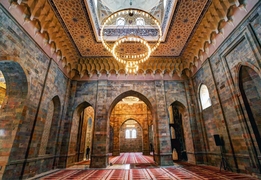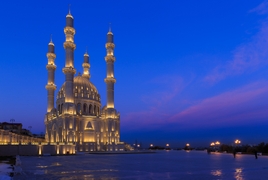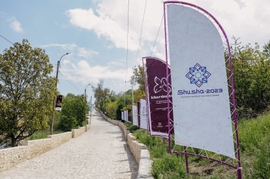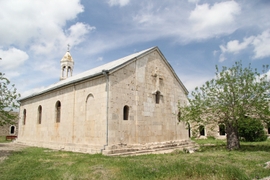Behind the flowers, gifts, champagne and a fancy meal that in some places accompanies celebrating #girlpower, International Women’s Day has a long history with an arc that bends towards the Caspian region. The fight for equality amongst genders may have begun in the streets of London and New York, but just over 100 years ago the fight for women’s rights had Russia as its epicenter.
March 8 is also being celebrated by activists, feminists and women’s groups around the world that take this day as an opportunity to push the movement forward. In honor of this year’s International Women's Day, Caspian News is taking a look at some of the most inspirational women of the region.
AZERBAIJAN
Azerbaijan was the first country in the Islamic world to give women the right to vote, and before equal voting rights came ashore to the United States and Europe. That achievement came 101 years ago, in 1918, when the Azerbaijan Democratic Republic was formed following the collapse of the Russian empire and before the expansion of the Soviet Union into the South Caucasus.
Azerbaijan has an economically active population of more than five million – almost half of them women, and many who are involved in the medicine, science and education sectors. Women are represented in parliament and, according to the UN Committee on the Elimination of Discrimination Against Women report in 2015, women are well represented within the judicial and prison systems, accounting for between 40 and 50 percent of total officers on average.
Durdane Agayeva, a contributor to the Jewish Journal, says a true inspiration for Azerbaijani women is Azerbaijan’s First Lady and First Vice President, Mehriban Aliyeva.
“Her activities in promoting gender equality and women’s education in the country and beyond are tremendous,” she notes in her article published to the journal’s website.
Azerbaijan’s First Lady leads the Heydar Aliyev Foundation, which undertakes educational initiatives and constructs or reconstructs facilities both in Azerbaijan and abroad. One such example of its work was the construction of a new girls’ school in Pakistan for 500 students.
KAZAKHSTAN
Women in Kazakhstan enjoy equal rights with men, but 100 years ago things were different.
Alma Orazbayeva was the first Kazakh woman to advocate for women’s rights and fought for equal opportunities in what is Central Asia’s largest country. Orazbayeva had been involved with the feminist movement in Kazakhstan since the 1920s, when she initiated a project called “Red Yurts” to educate Kazakh women. Specialists traveled across the country and taught women to read and write, explain new laws, and start a newspaper called “Steppe”.
In 1920, thanks to a proposal from Orazbayeva, the country’s leadership abolished kalym, an ancient form of dowry that required grooms to pay a price for his bride to his fiancée’s parents. Just four years later, in 1924, Kazakhstani women won the right to vote.
Kazakhstani women are involved in politics, as well as business, sports and media, but some believe that the concept of “gender” is still under development in Kazakhstan.
Zhanar Serkebaeva, the co-founder of the Kazakhstani feminist initiative named Feminita, believes that there are unsolved gender problems.
“It is hard to believe, but today there are those who sincerely believe that there is nothing to fight for and that all problems have been solved,” she said, according to Sputnik. “If so, why does every second woman in Kazakhstan experience male violence? Why do women receive only 70 percent of the level of payment that men get?”
According to statistical data, women participate in social life on an equal footing with men, however. The employment rate is approximately the same, but the wages are 33 percent in favor of men. The Association of Business Women of Kazakhstan is convinced that this is because women are mostly engaged in lower-wage jobs.
RUSSIA
Looking back at Russian history, which is abundant with powerful and influential women, and taking a look at modern-day Russian women who have influenced the world, the spirit of Russian women serves as a source of strength and perseverance.
Women comprise more than a half of the 144.5 million that reside in Russia today – the world’s largest country that is rich in history and charismatic female personalities. The modern women’s rights movement can trace its roots to 1917, when in the capital of the then-existent Russian Empire, Petrograd (now known as St. Petersburg) women textile workers began demonstrating throughout the city. This event marked a key component to the Russian Revolution, which brought down the czar and ushered in the formation of the Soviet Union. On March 8, 1917, women in Petrograd went on strike for "Bread and Peace" – demanding an end to the first World War, food shortages in the country, and the end of the Russian monarchy.
Today, just over a century later and following the collapse of both the Russian Empire and the USSR, Russian women are still going strong. Nearly 16 percent of the Russian State Duma (parliament) is comprised of females, or 71 seats out of 450. Valentina Matvienko, a strong and confident woman, now serves as speaker of Russia's Upper Chamber of Parliament, the Federation Council – the third most important figure after the president and the prime minister. Another female politician that has reached high levels is Elvira Nabiullina, who holds the position of Chairwoman of the Central Bank of Russia.
Russian women have managed to reach high levels in business as well. Russia ranks second in the world in 2018 in terms of women’s business ownership, according to the Mastercard Index of Women Entrepreneurs.
However, according to the Deputy Chairman of the Committee for Family, Women and Children Affairs of the State Duma, Oksana Pushkina, who is fighting to pass a bill on gender equality in State Duma, Russian women still have their work cut out for them.
“The problem of discrimination is not virtual, but measurable. It’s better to start now, work to be done on the block of problems,” Pushkina told Takiedela.
TURKMENISTAN
Although Turkmen women won the right to vote in 1924, the gender equality gap in Central Asia’s country still remains. Women and girls make up about half the population of over 5.4 million.
Female education in Turkmenistan has been a hot topic for a long time. Fewer than 40 percent of girls in Turkmenistan are studying at university level, in contrast to the other former Soviet countries like Kazakhstan and Kyrgyzstan. But in 2015, Turkmenistan adopted a National Action Plan on Gender Equality that assumed resource allocations from state and local budgets to help achieve gender equality.
Today, women hold 25.4 percent of positions in executive bodies and 26.4 percent of seats in the State Mejlis (Parliament), where the chairperson and a deputy chairperson are women. Women make up 42.3 percent of private sector employees and are strongly represented in social-cultural enterprises (63.7 percent), education (66.2 percent), as well as health care (63.7 percent).


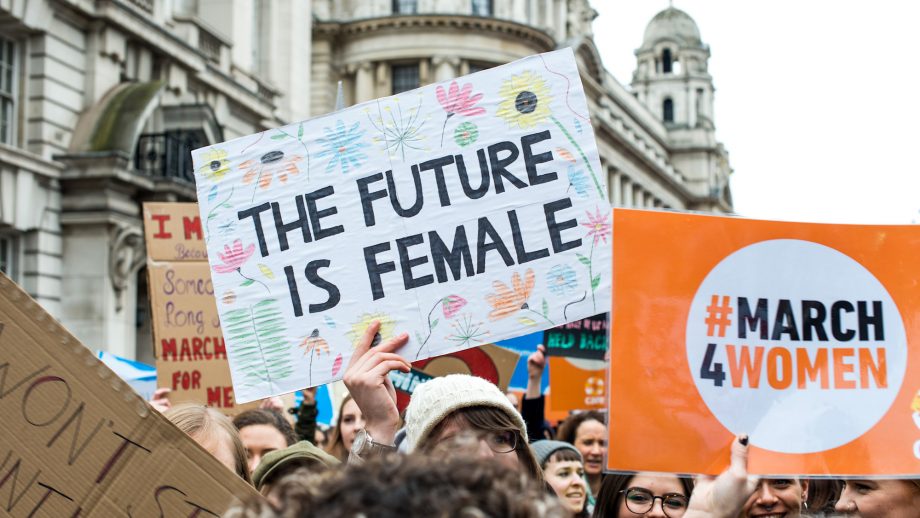




 President Aliyev emphasized the critical role of the North-South Transport Corridor in fostering transport cooperation between Azerbaijan and Russi...
President Aliyev emphasized the critical role of the North-South Transport Corridor in fostering transport cooperation between Azerbaijan and Russi...
 Russian Foreign Minister Sergei Lavrov has reasserted that Moscow has no intentions to stop the fighting in Ukraine, even if peace talks commence.
Russian Foreign Minister Sergei Lavrov has reasserted that Moscow has no intentions to stop the fighting in Ukraine, even if peace talks commence.
 Iran has refuted reports of alleged damage to Shimon Peres Negev Nuclear Research Centre located southeast of Dimona, Israel, during the recent air...
Iran has refuted reports of alleged damage to Shimon Peres Negev Nuclear Research Centre located southeast of Dimona, Israel, during the recent air...
 Iran and Pakistan have signed eight cooperation documents in various fields, and agreed to strengthen ties to fight terrorism in the region.
Iran and Pakistan have signed eight cooperation documents in various fields, and agreed to strengthen ties to fight terrorism in the region.
